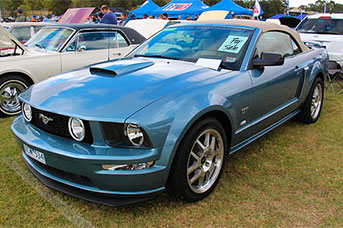10 Things You Should Know as a First-Time Mustang Owner

Welcome to the world of the Ford Mustang, a significant part of car culture for 60 years. Whether you've wanted a Mustang for years or decades, the wait is finally over. Now that the purchase is complete, it's time to embrace the ownership experience fully. Keep reading as we explore practical tips for keeping your Mustang running smoothly and dive into interesting Mustang lore.

1. Modifications and Aftermarket Equipment Await Your Mustang
The opportunities are endless for owners looking to put a unique stamp on their Mustang. From subtle cosmetic changes to significant performance upgrades, your imagination and budget are the only limitations. What's especially interesting is that modification components are readily available for Mustangs of all ages.
Some owners focus on appearance, while others concentrate on performance. And some incorporate both. There's no right or wrong. The Mustang aftermarket parts industry is massive. So you'll find upgrades of every type, from gear shift knobs to supercharger kits.
In truth, all these choices can be overwhelming. So, it's best to plan your mods, even if the projects stretch over the years. This way, you'll have goals in mind and can prioritize what's most meaningful. Where to start? That's up to you, but exhaust system and suspension upgrades are at the top of the list of many Steeda customers.

2. The Ford Mustang Has One of the World's Largest Enthusiast Communities
With Mustangs in continuous production for six decades and seven generations, this Ford has a massive following. Ten million Mustangs sold since 1964 translates into scores of enthusiast groups, car shows, and track days. Online Mustang forums like Mustang6G and the subreddit r/Mustang are an endless source of information and camaraderie. In the real world, the Mustang Club of America brings together enthusiasts through over 100 regional chapters across the U.S. You're never alone when it comes to Ford's original pony car.
Yet, this enthusiasm isn't just an American phenomenon; the Mustang is sold the world over. While the Mustang has been enjoyed across the globe since its early days, its popularity took on a new meaning with the arrival of the sixth generation in 2015. From day one, the S550 Mustang was designed with a worldwide audience in mind. There are right-hand drive versions, and in 2016, the Mustang claimed the title of Germany's best-selling sports car.

3. There's a Mustang for Every Budget
Part of the Mustang's broad appeal is the range of available models. Going back to the original Mustang, Ford wisely offered options ranging from a “sporty” car to a true sports car. Today, even the entry-level EcoBoost offers a genuine performance vehicle experience thanks to a potent turbocharged four-cylinder under the hood. Stepping up to the GT adds legendary V8 power, while many Mustang generations have embraced top-end status with the Shelby GT350 and GT500 variants.
No matter the need or price range, there's a Mustang that fits the bill. Nowhere is this more evident than in the second-hand market. Those with $5,000 can easily find a project car ready to roll, while an enthusiast with a six-figure budget will have no trouble adding a superior Mustang to their collection.

4. Independent Rear Suspension Changed the Mustang forever
If you own a 2015 or newer Mustang, one key difference you'll experience is its independent rear suspension (IRS). Before the S550 generation, Mustangs used a solid rear axle. Switching to an IRS vastly improved the Mustang's handling capabilities, ride comfort, and chassis balance.
As the name suggests, an independent rear suspension allows each rear wheel to move independently, following road contours better and providing more predictable handling. IRS also lowers unsprung weight compared to a heavy solid axle. Owners report that these newer Mustangs feel tighter and more agile than their predecessors while retaining that signature Mustang rear-wheel drive feel. At the same time, turn-in is sharper, body roll is reduced, and cornering is more neutral. The IRS transformation helped turn the Mustang into a world-class sports car.

5. Celebrate April 17
April 17, 1964, is a date every Mustang owner should know. That's the historic day the first Mustang went on sale. Ford dealerships received their first shipments of the new Mustang, and sales exploded immediately. Buyers snapped up over 22,000 Mustangs on day one, and Ford sold over 417,000 Mustangs within that first year.
April 17 is now celebrated as National Mustang Day, with Mustang club gatherings, car shows, and parades marking the iconic car's birthday. Each year, on April 17, Mustang owners commemorate the vehicle's legacy with tributes to that memorable 1964 debut. There are even official National Mustang Day badges you can proudly display to honor the original pony car's launch.

6. Understand the Importance of Regular Maintenance for Your Mustang
While there's no denying that the Ford Mustang is remarkable, this status doesn't exempt owners from performing regular maintenance. Following the recommended service schedule will keep your Mustang running strong for years. Don't neglect routine oil changes, fluid top-offs, tire rotations, filter changes, and belt replacements. In addition, be alert for any new noises, leaks, vibrations, or warning lights indicating potential trouble. Addressing issues early can prevent more significant (and expensive) problems down the road.
At the same time, learn your Mustang's unique quirks and inspect it regularly. Connecting with knowledgeable Mustang mechanics can help you stay on top of servicing needs. Keep in mind that you may need to shorten the maintenance intervals if your plans include performance use or extreme modifications. Taking care of your Mustang from day one protects your investment and enhances reliability. If your Mustang is newer, it's vital to know that proper maintenance preserves your Mustang's warranty coverage.

7. Get the Right Tires for the Right Job
One area that can get overlooked by a new Mustang owner is what connects the car to the road: the tires. Even if you've got a factory-fresh Mustang, understanding the importance of selecting the right tires is essential.
For instance, driving on summer tires is excellent for the hotter months or if you live in a warmer climate, but these treads will fall short if driving in snow is a factor. It's not unusual for a Mustang owner to have two sets of tires and wheels that get changed with the season. If your plans include track days or racing, you'll need ultra-high-performance tires designed specifically to handle the extreme conditions of competition. However, the softer rubber compounds that provide extra grip mean a shorter lifespan. Here's where having alternate sets of wheels and tires comes in handy.
Before deciding about tires for your Mustang, take some time to learn about tire construction, compounds, and types. Get advice from experts on the best tires for your Mustang based on your driving circumstances. The proper tires can take your Mustang's handling to the next level, while the wrong tires can be downright dangerous.

8. Drive Gentle at First
First-time Mustang owners need to avoid the initial temptation of hammering the gas and lighting up the rear tires, especially if there's something powerful under the hood. This is besides observing the 1000-mile break-in period for a factory-new Mustang (read the owner's manual).
You'll have plenty of opportunities to test your car's capabilities, but first, learning the nuances of your car's handling is crucial. Start slow, feel the chassis dynamics, and gradually build your confidence. Get used to inputs from the steering, clutch, shifter, brakes, and throttle. Each Mustang has its own character and quirks. Safely push the car harder through curves and on straights as your abilities improve.
Work up to checking the full performance potential of your Mustang once you've mastered control at lower speeds. Patience and prudence behind the wheel will keep you and your Mustang in one piece. Once you know the limits, there will be plenty of time to have fun.

9. Is the Mustang a Pony Car or a Muscle Car?
There's often debate: is the Ford Mustang a pony car or a muscle car? In reality, it's both. When launched in 1964, Ford (along with the Plymouth Barracuda) helped create a new vehicle segment dubbed “pony cars.” Later, the Chevrolet Camaro and Pontiac would join in to offer consumers small, sporty, affordable coupes with long hoods and short rear decks.
During the late 1960s, big block V8 engine options also transformed the Mustang into a formidable muscle car. So, the Mustang straddles both categories, blending pony car style and proportions with traditional muscle car power. It's this combination that gives the Mustang its universal appeal. At its core, the Mustang is the quintessential American pony AND muscle car.

10. Know Your Mustang Generations
As a first-time Mustang owner, you may not be aware of the model's history. After all, it's Ford's longest-running nameplate still in production. Here's a brief overview of each generation:
First Generation (1964-1973)

Ford's original pony car set Mustang design standards that are still used today.
Second Generation (1974-1978)

Ford launched the Mustang II due to energy and environmental concerns, but the effort fell short with fans. The second-generation Mustang is the least appreciated today, but there's a growing recognition for how this edition kept the nameplate alive. That said, the Cobra II still can turn heads among Mustang enthusiasts.
Third Generation (1979-1993)

Ford breathed new life into the Mustang franchise with the launch of the Fox Body generation. Styling paid tribute to the original edition while incorporating more modern elements. This period marked the introduction of the legendary Mustang GT 5.0 and helped maintain the Mustang legacy. Ford had initially intended to replace the Fox Body with a front-wheel-drive Mustang (that went on to become the Ford Probe). Yet fans revolted, preserving the rear-wheel-drive orientation that purists appreciate.
Fourth Generation (1994-2004)

After the Fox Body's record run, Ford introduced the fourth-generation Mustang. Called the “SN95” in Ford's internal language, this edition shifted from softer lines to a more sculpted look while retaining original Mustang design cues. A comprehensive refresh followed for the 1999 model, earning these Mustangs the “New Edge” moniker. However, some refer to the entire fourth generation as the SN95 Mustang.
Fifth Generation (2005-2014)

The S197 Mustang finally cast aside the remaining remnants of the Fox Body platform in the SN95. The fifth generation returned to a more retro look, and its new platform improved weight distribution and handling.
Sixth Generation (2015-2023)

Seeking to keep the Mustang relevant in the face of competition (the resurrected Dodge Challenger and Chevrolet Camaro), Ford gave the S550 contemporary styling. More importantly, adding an independent rear suspension radically transformed the Mustang's handling for the better.
Seventh Generation (2024-Current)

Worried about hybrid and all-wheel-drive rumors, Mustang loyalists relaxed when the S650 debuted with the model's original formula intact (rear-wheel drive and conventional power). Crisp styling and the right amounts of modernity (like an all-digital dashboard) keep the Mustang a head-turner in a world dominated by SUVs and trucks. The Dark Horse edition is the Mustang's first new performance variant in over 20 years.
Related Articles
-

How To Find Local Mustang Clubs Near You
-

How To Buy A Used Mustang
-

Does Modifying My Car Void My Warranty?
Source: MustangSpecs


